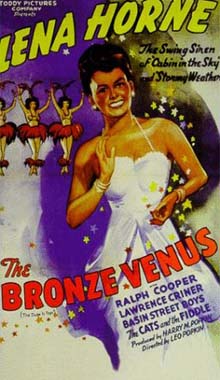 Cosmetic revisionism is a fact of life in the world of fashion; the $250 billion fashion industry couldn’t exist without it. But a new not-quite controversy has again raised the issue of just where people of color, African Americans in particular, fit in an industry that has historically been as much about denying darker hues as a fashion symbol as embracing it.
Cosmetic revisionism is a fact of life in the world of fashion; the $250 billion fashion industry couldn’t exist without it. But a new not-quite controversy has again raised the issue of just where people of color, African Americans in particular, fit in an industry that has historically been as much about denying darker hues as a fashion symbol as embracing it. On Thursday the French cosmetics giant L’Oreal was in damage control mode, denying a report on the TMZ Web site that it had lightened the skin tone of Beyonce Knowles in the L’Oreal advertisement now gracing the September issue of Elle, Allure and Essence magazines.
A post Wednesday on the TMZ site did a side-by-side comparison of Knowles as she appeared in the ad and as she appeared in a recent photograph. The contrast between the two is unmistakable.

“Unless she just got vitiligo — L'Oreal has some serious splaining to do about its bleached-out Beyonce ad!” TMZ shouts with its usual snark.
L’Oreal, maker of Garnier hair products and the Lancome skin care line, begs to differ.
“We highly value our relationship with Ms. Knowles,” the company said in a statement sent to the Associated Press on Thursday. “It is categorically untrue that L’Oreal Paris altered Ms. Knowles’ features or skin tone in the campaign for Feria hair color.”
◊ ◊ ◊
 It all might have been nothing more than a tempest in a bottle of peroxide if not for history — the cultural history of America and black folks’ place in it.
It all might have been nothing more than a tempest in a bottle of peroxide if not for history — the cultural history of America and black folks’ place in it.Students of popular culture and where black people fit in that culture no doubt recall what happened to Lena Horne, the legendary singer and actress, who signed a contract with MGM Studios in 1942 only to have to endure the insult of studio executives trying to remake her as a Latino.
After the actress rejected this attempt at obscuring her black-American Indian heritage, the studio hired Max Factor to design a special makeup, dubbed “Light Egyptian,” to darken her skin — in part as a sop to moviegoers in the Deep South, who were thought likely to reject such a glamorous woman whose ancestry was black.
It’s not just something found deep in the history books either. On March 4th of this year, the Daily Kos Web site showed side-by-side screen grabs of Sen. Barack Obama taken during the one-on-one presidential debate with Sen. Hillary Clinton in Cleveland the week before. The first screen grab showed an apparently unaltered network news feed. The second screen grab, used in a Clinton campaign ad, shows a clearly darker-skinned Obama.
 And then there’s Matt Mahurin’s controversial 1994 Time magazine cover-image “photo-illustration” of O.J. Simpson after his arrest on murder charges. The LAPD mug shot of Simpson was provocatively darkened by Mahurin in a case of creative license that went off the rails.
And then there’s Matt Mahurin’s controversial 1994 Time magazine cover-image “photo-illustration” of O.J. Simpson after his arrest on murder charges. The LAPD mug shot of Simpson was provocatively darkened by Mahurin in a case of creative license that went off the rails.You want to give L’Oreal the benefit of the doubt; Beyonce’s lucrative relationship with the company, after all, goes back to 2001. And as the Jezebel Web site shows, there's been sensitivity to the subject, reflected in the hiring of black models for fashion ads by L'Oreal and other companies who have discovered that — this just in — black women spend money.
But the goose eggs in the Jezebel table reflecting the number of black models in fashion editorial (magazines) tell another story.
That lack of consistency on the part of Big Fashion about hiring models of color points to a strange irony in this, the identity issue that won't go away: It's, well, sadly illuminating that in our ravenously cosmetic culture, the presumably forward-thinking fashion industry could be so far behind the times they're supposed to be ahead of.
-----
Image credits: Beyonce single: beelover9481, republished under Creative Commons Attribution 2.0 license. Beyonce two-shot: FilmMagic/L'Oreal. Lena Horne: © 2002 Xenon. O.J. Simpson cover: © 1994 Time Inc.






1 comment:
Great post! When will they understand that black people come in 31 flavors, and they can't "lighten" or "darken" us enough?
Post a Comment